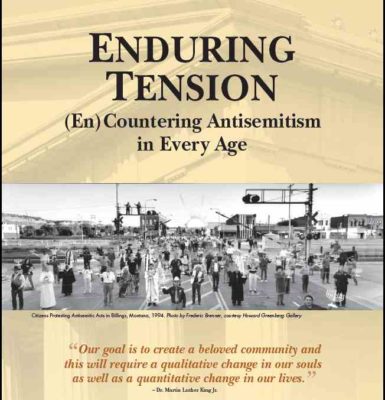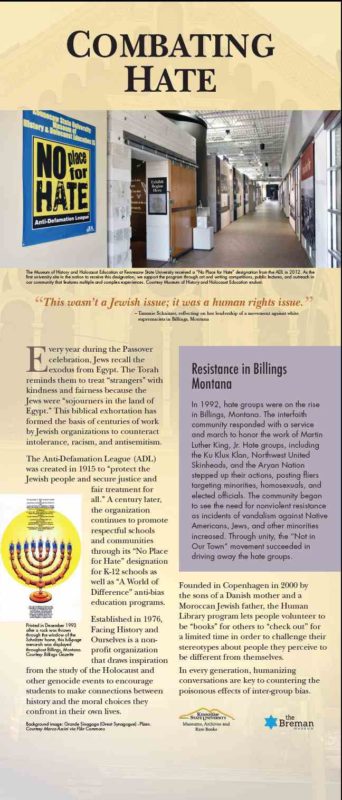Editors’ conversation on Pittsburgh
02 November 2018 – editors

Image credit: Museum of History and Holocaust Education at Kennesaw State University
Editors’ Note: The History@Work editors thought our readers might be interested in the following conversation prompted by the attack at the Tree of Life synagogue in Pittsburgh on October 27, 2018.
Will Walker: Adina, do you think you could write something about Pittsburgh that connects to the history of U.S. anti-Semitism and violence?
Adina J. Langer: Here’s a draft of the statement for our new exhibit, Enduring Tension: (En)countering Antisemitism in Every Age at the Museum of History and Holocaust Education at Kennesaw State University, that we will be putting up on our website shortly.
Enduring Tension: (En)countering Antisemitism in Every Age
When we began planning for this exhibit a year ago, we did so with the knowledge that antisemitism was on the rise around the world. But we did not anticipate that our exhibit opening would coincide with the deadliest attack on Jews in American history.
Our work is acutely, painfully relevant. The Museum of History and Holocaust Education’s mission is to present public events, exhibits and educational resources focused on World War II and the Holocaust in an effort to promote education and dialogue about the past and its significance today. Enduring Tension: (En)countering Antisemitism in Every Age explores the long history of anti-Jewish bias in the United States within an international context. The exhibit asks a critical question: must we live with hate? And if we believe that hatred must be combated, what are the best ways to do so?
In 1966, Reverend Martin Luther King Jr. reaffirmed his commitment to nonviolence in the pursuit of civil rights, saying “Our goal is to create a beloved community and this will require a qualitative change in our souls as well as a quantitative change in our lives.”
At this pivotal moment in American history, our beloved community is threatened by hateful rhetoric which can, and has, moved people to unimaginable violence. America is a strong nation, empowered by diversity and a commitment to justice. Jews have been a thread in the American tapestry since the first Europeans arrived in North America hoping to build a life in a new land. America will endure, and the Jewish people will endure. But that endurance must come with a renewed commitment to seek justice, to push against bigotry, to counter inter-group bias along the spectrum from misunderstanding to the depths of hatred and annihilation.
We at the Museum of History and Holocaust Education dedicate our newest exhibit to the Jewish community of the Tree of Life Synagogue in Pittsburgh. And we re-dedicate ourselves to the work we have embraced and to our core values:
– Multiple and complex human experiences
– Ethical and political consequences
– Respect for difference and diversity of life
– Acceptance of civic and personal responsibility
The more we learn about other people, the more willing we are to accept them into our community. By chronicling the history of antisemitism, and efforts made in every generation to counter it in positive ways, this exhibit seeks to bring us closer to achieving Martin Luther King Jr.’s dream of a “beloved community.” We offer this traveling exhibit to our community to build understanding one location at a time.
You can also find a more personal response here.

Image credit: Museum of History and Holocaust Education at Kennesaw State University
Modupe Labode: Adina, what you wrote here is very useful and heartfelt.
I was really struggling with what to say about the synagogue shooting to my classes. I was aware of how the president’s use of language, and the increasing acceptance of hate speech tropes and conspiracy theories, make any type of public speech much more difficult, because there are few agreed-upon norms. I ended up stating very clearly the reasons why we should care about this attack—that anti-Jewish violence has a horrifying history. I linked to the US Holocaust Memorial Museum’s press releases on Saturday’s attack, Charlottesville, and the 2016 meeting of the alt-right in Washington, D.C. I also found the USHMM’s “Defusing Hate” resource. I think that this resource will help me think through the concerns I have when people advise countering hate speech with more speech. It’s not that there shouldn’t be more speech, but that it’s important for those of us who oppose hate speech understand that confronting hate often requires careful, precise strategies.
I think that museums and historic sites need to be involved in helping visitors think through the historic origins and patterns of hatred. Simply repeating clichés such as “people who don’t remember the past are doomed to repeat it” clearly isn’t working.
WW: Modupe, these are very helpful ideas and resources. I think I’ll borrow (steal) them for my classes. I first wrestled with how to address the shooting in another context—a Sunday school class that I was scheduled to teach the next morning. I decided to teach the kids the word “shalom” and to share with them a Jewish folk song in Hebrew—“Shalom Chaverim.” You can find a nice recording of kids singing it here. I did not attempt to talk about the shooting directly—it was addressed explicitly, however, in the worship service afterwards, which the children attended. I did try to convey the idea, though, that people of all faiths and from all backgrounds are our “neighbors.” I had the children do a craft where they wrote the words “Shalom” and “Neighbor” on a sheet of construction paper and then drew pictures to represent these ideas.
AJL: How sweet, Will. I appreciate your efforts and additions. I know for me this incident has unsettled me so deeply because of the ways it has intersected with my many identities—as an American citizen, a descendant of immigrants, a mother, a Jewish person of faith, an educator, and a historian with a responsibility to my community. There are so many ways to feel responsible and, it sometimes seems, as many ways to feel impotent. I suppose we all try to get through this world the best we can. . .
~ Adina Langer is the curator of the Museum of History and Holocaust Education at Kennesaw State University. You can follow her on Twitter @artiflection
~ Modupe Labode is an associate professor of history and museum studies and public scholar of African American history and museums at IUPUI. She is a member of the NCPH board of directors.
~ Will Walker is associate professor of history at the Cooperstown Graduate Program, SUNY Oneonta. You can find him on Twitter @willcooperstown.



